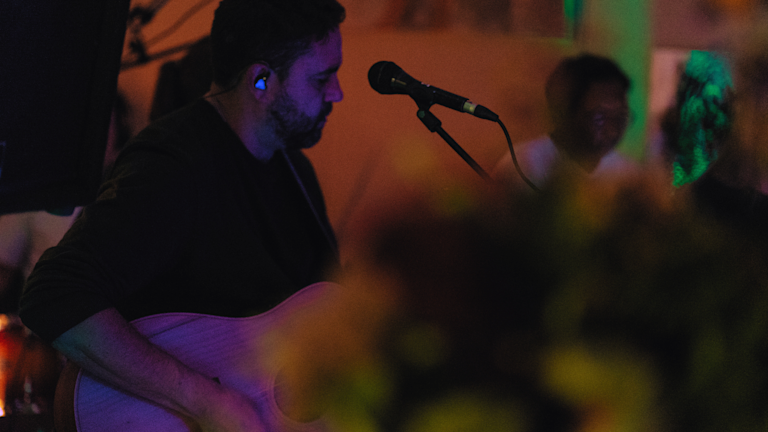February 24, 2025
“Go to the land that I will show you” (Genesis 12:1).
These words spoken to Abraham centuries ago stirred in me. It was the spring of 2017, as I prepared a sermon series at our church in Kitchener, Ontario. I had served there for ten years and was in a process of discernment: Was God calling me to remain in this community for another season?
Perhaps it is cliché that God used this text to confirm a missional call, but that is the case. I knew that Carla and I were called to leave the church and pioneer a new project somewhere, but we did not know where or how. Like Abraham, however, God called us to respond in faith to the inner stirring of the Holy Spirit to go where God would show us.
What led to this moment is a longer story, but not disconnected to the experience of the Western church in the 21st century. Western society had drastically changed in the 20th century, especially after (and because of) the world wars in Europe. As Mennonite Brethren historian and theologian, J.B. Toews describes it, "the Postwar era created a new context. The revolutionary changes that followed 1945 affected all areas of social as well as religious life. People in the churches began to question long-held spiritual understandings and churchly practices. The moors of the past grew slack" (A Pilgrimage of Faith, 205).
That is, not only was there development in science and technology, but the moral landscape also changed. People abandoned churches for a more strictly secular life. As our city grew, becoming more modern, our church in Kitchener struggled to grapple with these changes in modern society. What does blessing look like in changing sands of culture? How can we be missionally fruitful in a secular, modern society? His call for us was to reimagine what it means to engage Western cultures with the Gospel.
The Culture of Abraham
The seismic transformative changes that we are witnessing today are seemingly comparable to the changes that occurred over the centuries in the Chaldea, the home culture of Abraham. That is, comparable in the sense of radically changing not just the course of a region, but the course of the world.
We know that Abraham and his family originally came from the city of Ur in Chaldea (Genesis 11:28). The Chaldeans were an advanced civilisation for their time. According to historians, they were the site of the first urban cities (see The Sumerians: Their History, Culture, and Character). This society developed astronomy and invented the wheel and writing. It was here in this area that people began to live a settled life and developed technologies used in agriculture and architecture, as well as more complicated religious practices. The Epic of Gilgamesh and Enuma Elish, some of the oldest works of religious literature, originated here.

It was also a culture not immune to injustice. Interestingly, the first written documents in human history were written by an accountant, with a list of barley and slaves. The Bible subtly addresses the spiritual brokenness and corruption of this culture. For instance, there is the story of "Babel," "Come let us build ourselves a city, with a tower that reaches to the heavens, so that we might make a name for ourselves; otherwise, we might be scattered across the whole earth" (Genesis 11:4). There we see brokenness and fragmentation because of pride. They had tried to build a tower that could reach heaven.
In fact, urbanisation in this context seems to be a resistance to God's blessing to flourish and multiply. God has created humanity in his image and commanded them to multiply, spread across the earth, and flourish (Genesis 1:27-28). Humanity would represent the image of God in the world, as stewards and ambassadors. However, in contrast, people wanted to stay in one place and make their own name great. They wanted to represent their own sovereignty. The culture of Chaldean, therefore, represents the separation from Eden, the image of God in people is corrupted.
We don't know exactly why Abraham's family left the area of Ur. Perhaps they were looking for a new place to live because of overpopulation. What we do know is that Abraham’s father died, as well as his brother, Haran (Genesis 11:27-32). I imagine him in a state of mourning. Furthermore, his wife Sarai was barren. In their home ancient eastern culture, this means that Abraham and Sarai have no future, no security, no retirement insurance. Abraham's honour was at stake. What does their future hold? Do they have hope?
I wonder if the author of Genesis is also subtly communicating something about the spiritual state of humanity through the story of Abraham and Sarah. According to Walter Brueggemann, "Barrenness is the way of human history. There is no forseeeable future. There is no human power to invent a future" (Genesis, 116). That is, due to broken relationship between God and humanity, there is a spiritual bareness in the culture.
Despite urbanisation and technological advancement, there is still emptiness and brokenness. Our human efforts to build towers to the heavens and make our name great are only empty, corrupted expressions of human sin and pride. Something is needed to redeem us.
Modern Towers of Babel
Our 21st modern society is more technologically advanced than Chaldea in 3000 BC. We live in a world that Abraham could hardly have imagined: modern physics, computer technology, and now the advent of artificial intelligence. AI technologists like Sam Altman are working to extend human life. Science fiction is no longer just fiction. It's like Babel, through human ingenuity, we are progressing to an unknown future. What's to stop us now?

But it is the same pride in modern society as then. To think that we can redeem ourselves and with our science, technology, and modern morality. To think that we could build a tower that reaches heaven.
Despite our technological advancement and increased urbanisation, we are also still broken and fragmented. According to Toews, this has led to an increase secularisation, pluralisation, and privatisation, which he describes as "the process of a paganising culture. Modernity strips humanity of certainty and miniaturises faith" (A Pilgrimage of Faith, 210). Truth is relativized or perceived only from subjective experience. There is an inordinate focus on individual sovereignty, defining the self as one sees fit or pursuing individual success above the community.
In Germany, I often work in cafés, where I converse with people about what their perspective on the question of society. Despite the material comfort that many enjoy, there is an uncertainty about the future. There are concerns about growing extremism. One man lamented that our hyper online-connectivity has only created isolated bubbles, rampant misinformation, and social manipulation. Our modern towers of Babel have not succeeded in bringing a deeper purpose and unity to humanity.
In light of the story of Abraham and Sarah, there is a tangible sense of spiritual bareness in our society. In such a situation, it is easy to lose hope and despair. My question is, how can we experience and bring blessing to the people? How can we experience true spiritual fruitfulness so that others might too receive God's blessing? How might we, in other words, bring Gospel renewal to people in our world?
Step into the Unknown
God is in the business of calling people to the unknown, stepping out in faith to pursue his calling on our lives.
God spoke to Abraham, "The Lord had said to Abram, ‘Go from your country, your people and your father’s household to the land I will show you" (Genesis 12:1). God calls him out. In the midst of grief and despair, God spoke personally and directly. For Abraham, it was a calling to a land that God would show him. God gave him a new direction. He spoke of the possibility of a new future. God gave Abraham hope.
In the biblical story, we see an image of God speaking personally to people, to Adam and Eve, to Noah and now to Abraham. The Creator, who called the world into existence through his word, speaks directly to begin a work of redemption. We are shown a personal God, who seeks relationship and community. Human beings are separated from him. The image of God in them is distorted. Society is broken and fragmented. But that is not the last word. God speaks and calls in order to give new possibilities and a future. God speaks to redeem and restore.
There was a new future for Abraham and Sarai, but Abraham had to respond to it. He needed to let go of the old, of the past, of the griefs that held him back. He must believe and trust the voice he had heard. He must surrender. And he did: he took the first step. But it was God who took the initiative. God spoke – and Abraham responded.
God is still in the business of calling people to the unknown. His Word breaks up the hard ground of secularity, calling us into a life of faith.
In 2017, as I was preparing a sermon series on this story, God stirred in me and Carla a desire to step out to the land that God would show us. We did not know how or where. Our Eastern Canadian Multiply Mobilisers, Philip and Robyn Serez, encouraged to take the risk and go on a vision tour in Europe, listening to God's voice and getting to know the missional needs in this region.
We traveled to Germany, visiting pastors and missional leaders. It was in this time that God clearly called us to this nation to assist in the work of church planting. God made clear the "land." We were staying on a farm in France during a mission debrief week. There was a storm one night and I could not sleep. But God laid Germany on my heart. I shared this with Carla the next morning and she sensed a divine peace. That morning in the stall in the barn, a new colt was born. This for us was a sign of a new call. We still did not the "how" God might lead us in this call, but it was a radical step into the unknown.
Wait on the Promised Blessing
Blessing means active waiting on the promise of God.
God had also promised Abraham that he would bless him; "I will make you into a great nation, and I will bless you; I will make your name great, and you will be a blessing" (Genesis 1:2). But what does it mean to be blessed? In the cultural context of the time, blessing meant gaining honour and influence through the growth and multiplication of the family. In Babel, people tried to gain these blessings themselves by making a name for themselves. They wanted to control their blessing. Here, however, it is the other way around: God himself will make Abraham's name great. Abraham does not have to strive for honour, influence or greatness. He is to simply trust God and believe in His Word.
But how can Abraham, without a son, have offspring and multiply? In Genesis 15, this promise is substantiated: God promises Abraham that he will have a son. As many stars as in the sky will be his descendants. Abraham believes in God. But this faith must be tested. Abraham and Sarah must wait in faith. They must trust God in this blessing. Sarah will bear a son in her old age. And therein lies the central challenge in the story of Abraham and Sarai: Will they trust God to make this miracle happen? Does God really have the power and might to do the seemingly impossible?
Faith means that active waiting in God to intervene and bless in his own timing and way.

In the larger biblical narrative, the authors of the New Testament see in the story of Abraham a Proto-Gospel—an early reference to Jesus Christ, the promised Messiah. The apostle Paul will write about Abraham’s faith at length, as a witness to the coming faith of Jesus, "the promises were spoken to Abraham and to his seed. Scripture does not say ‘and to seeds’, meaning many people, but ‘and to your seed’, meaning one person, who is Christ" (Galatians 3:16). The miraculous birth of Isaac points to the miraculous birth of Christ. This time, not from a woman in old age, but from a virgin.
Waiting on and living for God's promise of blessing is not easy. Abraham and Sarah will be tempted to take God's idea into their own hands. They tried to ensure a son through Hagar. What followed was only more brokenness, mistrust, and division in the home. As Brueggemann states, "The threat and the possibility articulated in the narrative of Abraham and Sarah put a crisis before humanity. It is the crisis of deciding to live either for the promise, and so disengaging from the present barren way of things, or to live against the promise, holding on grimly to the present ordering of life" (Genesis, 113).
However, God is faithful to his promise. God bears the fruit of his blessing.
Since moving to Germany in 2019, we have been privileged to serve with a team in Dortmund and help plant a church called PräsentKirche. Working with great team, we have seen people give their lives to Jesus and grow in the image of God. We have seen people from various ethnic backgrounds united in Christ. We have seen others take steps of faith like Abraham and Sarah, going to other cities in Germany to share the good news of Jesus and plant new faith communities. God is working to reconcile peoples to himself through Christ.
Bless the Nations
We are blessed to bless others. The promise of God is not for ourselves only, but to be shared.
God promised Abraham that through him the nations would be blessed, "I will bless those who bless you, and whoever curses you I will curse; and all peoples on earth will be blessed through you" (Genesis 12:3). God's blessing was not only on Abraham himself, but also to the nations. The dispersion and confusion of Babel and the separation of the nations were to be overcome through God's work in this family. God's great vision was to reconcile, heal and redeem the whole world. And he chose to work through Abraham and his family to accomplish this redemptive plan. Through Abraham, God would make a nation that would be light to the nations.
The doctrine of election does not mean that God's people have an exclusive privilege over the ‘non-elect’. Abraham was chosen and blessed to participate in God's great mission for the nations, for the whole world. God's heart beats for the reconciliation of people. God blesses us and "elects" us, that we might bless others and call them to receive the blessing we have received.
This vision of blessing for the nations is fulfilled in Jesus Christ. He lived perfect faith and unwavering faithfulness to God (Philippians 2:1-9). Jesus alone is worthy to be our connection to God. He has prepared the way back into the garden. He alone can reconcile and heal our world. He alone can unite us. He alone can redeem our brokenness and fragmentation.

We are called to bless the nations, bless others, with the blessing we have received in Jesus Christ. Our faith in Christ is not just a private good, but a gift for the public good. It must be shared.
Carla and I have for the last several years now served with the Multiply Network on a church planting assignment in Dortmund, Germany. Multiply is a mission agency of the Mennonite Brethren, with over a 150 years of seeking to bless the nations with the Gospel. One of the first was, appropriately named for this meditation, Abraham Friesen, who sensed God's call to leave Russia in the late 19th century and go India. As Toews writes, Abraham left "position, possessions and the security of a comfortable future, this gifted young man began preparing to evangelise the lost" (A Pilgrimage of Faith, 95).
There are many other people in this network and in this larger faith community, who are called to step out into the unknown and courageously put their hope in the promised Messiah.
Along with our work with Präsentkirche, in 2024, we started the Pickaxe Project as a missional extension of Multiply, with the focus of "breaking ground for new life." Our mission is to inspire Gospel renewal through creative cultural engagement. That is, we endeavour to help people enter the blessed, transformative life revealed in Jesus. We are also making steps to multiply and plant another church in Dortmund.
In the light of our spiritual barren societies, Jesus is our hope for true spiritual fruitfulness. We see ourselves as co-labourers, partners in mission. It is not just limited to a European context, but also to all nations. We invite you to join us in this missional journey.
Sources
Brueggemann, Walter. Genesis: Interpretation. Louiseville, Kentucky: Westminister John Knox Press, 2010.
Kramer Samuel Noah. The Sumerians: their History, Culture, and Character. Chicago, Illinois: Chicago University Press, 1971.
Toews, J.B. Pilgrimage of Faith: The Mennonite Brethren Church, 1860-1990. Winnipeg, MB: Kindred Press, 1993.

